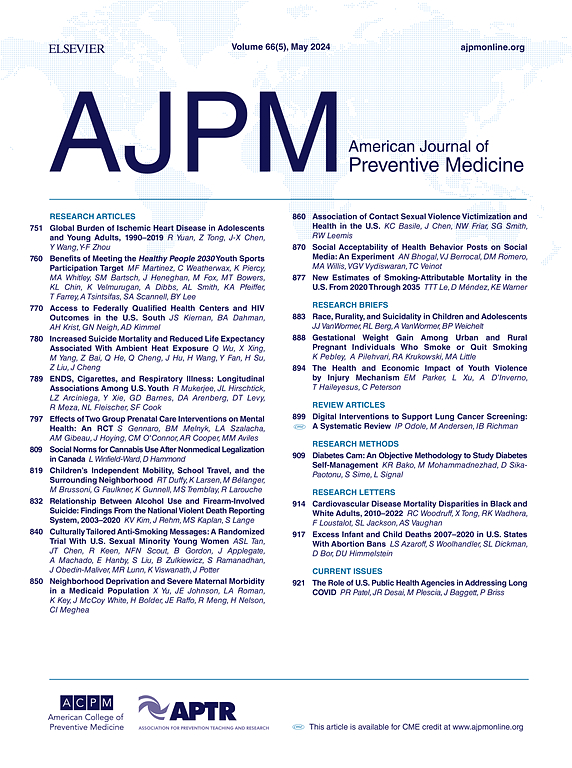超加工食品摄入与自述关节炎之间的关系。
IF 4.3
2区 医学
Q1 MEDICINE, GENERAL & INTERNAL
引用次数: 0
摘要
简介:超加工食品(upf)通常富含脂肪、盐、糖和食品添加剂,这可能会导致关节炎的发展。这项研究调查了UPF摄入量与自我报告的关节炎之间的关系。方法:采用2001-2018年美国国家健康与营养调查(NHANES)数据,分析2023年UPF摄入量与关节炎之间的关系。upf是通过将Nova分类应用于24小时饮食回忆数据来确定的,并以每日总能量摄入的百分比表示。结果是自我报告的医生对关节炎、骨关节炎和类风湿关节炎的诊断。在控制年龄、性别、种族/民族、吸烟状况、健康保险状况和贫困收入比的情况下,采用调查加权logistic回归分析UPF摄入量与结果之间的关系。结果:upf贡献了美国人口每日总能量摄入的55.2%:在调整协变量后,发现upf的每日总能量摄入与自我报告的关节炎之间存在正相关(校正优势比[AOR]与摄入量每增加10个百分点相关:1.04;95%可信区间[CI]: 1.02-1.05)。对于UPF摄入量的第二、第三和第四四分位数,关节炎的优势比分别为1.12 (95%CI: 1.02-1.23)、1.19 (95%CI: 1.07-1.32)和1.24 (95%CI: 1.11-1.38) (P为线性趋势)。结论:在这个具有全国代表性的美国成年人样本中,较高的UPF摄入量与整体关节炎和类风湿关节炎有关。本文章由计算机程序翻译,如有差异,请以英文原文为准。
Association Between Ultraprocessed Food Intake and Self-Reported Arthritis
Introduction
Ultraprocessed foods are typically high in fat, salt, sugar, and food additives, which may contribute to the development of arthritis. This study examined the association between ultraprocessed food intake and the presence of self-reported arthritis.
Methods
The 2001–2018 U.S. National Health and Nutrition Examination Survey data was used to analyze the association between ultraprocessed food intake and arthritis in 2025. Ultraprocessed foods were identified by applying Nova classifications to 24-hour dietary recall data and expressed as a percentage of daily total energy intake. The outcomes were self-reported physician's diagnosis of arthritis, osteoarthritis, and rheumatoid arthritis. Survey-weighted logistic regressions were conducted to analyze associations between ultraprocessed food intake and outcomes, controlling for age, gender, race/ethnicity, smoking status, health insurance status, and poverty-to-income ratio.
Results
UPFs contributed 55.2% of the daily total energy intake in the U.S. population. After adjusting for covariates, a positive association was found between daily total energy intake from ultraprocessed foods and self-reported arthritis (AOR associated with each 10-percentage point increase in intake: 1.04; 95% CI=1.02, 1.06). For the second, third, and fourth quartiles of ultraprocessed food intake, the AOR of arthritis was 1.14 (95% CI=1.04, 1.25), 1.22 (95% CI=1.10, 1.35), and 1.27 (95% CI=1.14, 1.41), respectively (p for linear trend <0.001). A positive association was also observed between ultraprocessed food intake and rheumatoid arthritis (AOR=1.05; 95% CI=1.02, 1.09) but not for osteoarthritis.
Conclusions
In this nationally representative sample of U.S. adults, higher consumption of ultraprocessed foods was associated with overall arthritis and rheumatoid arthritis.
求助全文
通过发布文献求助,成功后即可免费获取论文全文。
去求助
来源期刊

American Journal of Preventive Medicine
医学-公共卫生、环境卫生与职业卫生
CiteScore
8.60
自引率
1.80%
发文量
395
审稿时长
32 days
期刊介绍:
The American Journal of Preventive Medicine is the official journal of the American College of Preventive Medicine and the Association for Prevention Teaching and Research. It publishes articles in the areas of prevention research, teaching, practice and policy. Original research is published on interventions aimed at the prevention of chronic and acute disease and the promotion of individual and community health.
Of particular emphasis are papers that address the primary and secondary prevention of important clinical, behavioral and public health issues such as injury and violence, infectious disease, women''s health, smoking, sedentary behaviors and physical activity, nutrition, diabetes, obesity, and substance use disorders. Papers also address educational initiatives aimed at improving the ability of health professionals to provide effective clinical prevention and public health services. Papers on health services research pertinent to prevention and public health are also published. The journal also publishes official policy statements from the two co-sponsoring organizations, review articles, media reviews, and editorials. Finally, the journal periodically publishes supplements and special theme issues devoted to areas of current interest to the prevention community.
 求助内容:
求助内容: 应助结果提醒方式:
应助结果提醒方式:


